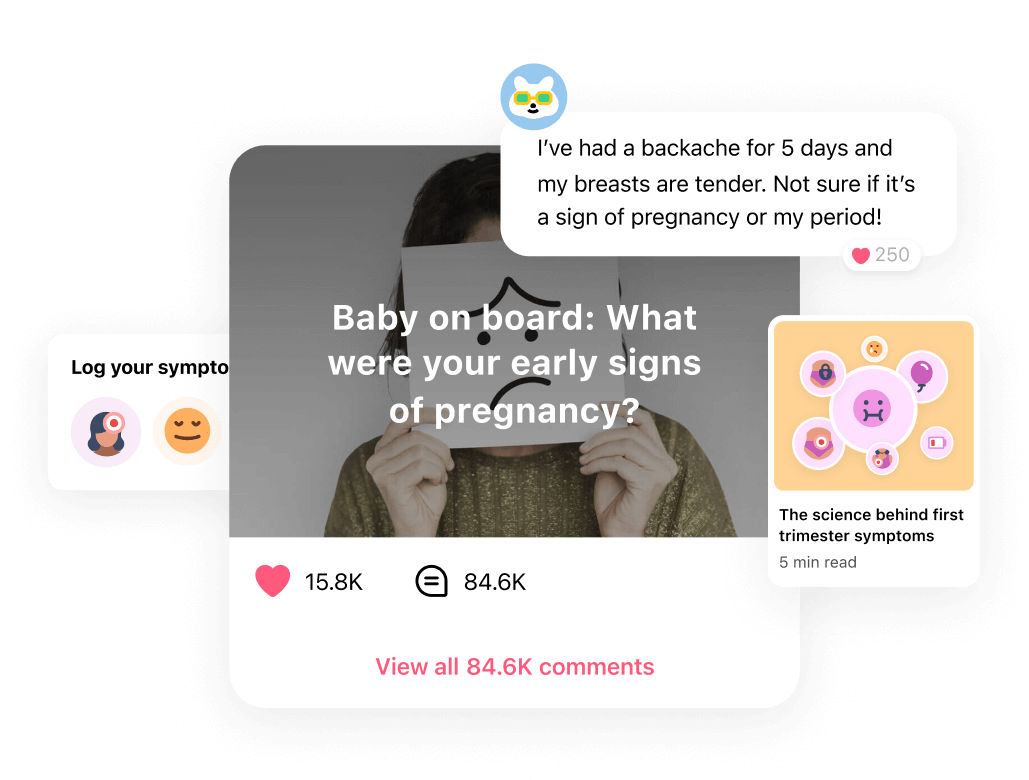You might be keeping an eye out for the telltale signs that you’ve conceived this cycle, but here’s everything you need to know about implantation bleeding.
-
Tracking cycle
-
Getting pregnant
-
Pregnancy
-
Help Center
-
Flo for Partners
-
Anonymous Mode
-
Flo app reviews
-
Flo Premium New
-
Secret Chats New
-
Symptom Checker New
-
Your cycle
-
Health 360°
-
Getting pregnant
-
Pregnancy
-
Being a mom
-
LGBTQ+
-
Quizzes
-
Ovulation calculator
-
hCG calculator
-
Pregnancy test calculator
-
Menstrual cycle calculator
-
Period calculator
-
Implantation calculator
-
Pregnancy weeks to months calculator
-
Pregnancy due date calculator
-
IVF and FET due date calculator
-
Due date calculator by ultrasound
-
Medical Affairs
-
Science & Research
-
Pass It On Project New
-
Privacy Portal
-
Press Center
-
Flo Accuracy
-
Careers
-
Contact Us
Can implantation bleeding be heavy?


Every piece of content at Flo Health adheres to the highest editorial standards for language, style, and medical accuracy. To learn what we do to deliver the best health and lifestyle insights to you, check out our content review principles.
You’ve noticed blood in your underwear, but it’s much lighter than your period. So what is it? While bleeding between your periods, known as spotting, isn’t uncommon, what you might be experiencing is what doctors call implantation bleeding.
You may not have heard of implantation bleeding before, but it’s pretty common. In fact, a quarter of women experience it in the earliest stage of pregnancy. The confusing thing is that it often comes around the time when you might expect your period to start. So it can be tricky to figure out whether your period has arrived early or if it’s a sign of something else, like implantation.
So, here’s the lowdown on implantation bleeding — from what causes it to how to figure out what’s going on for you.
Key takeaways
- Implantation is the term used to describe when your fertilized egg attaches to your uterine lining. This is the point in your conception journey when you’re officially classed as being pregnant, and it can happen around six to ten days after a sperm fertilizes your egg.
- You might be curious why this would make you bleed since your fertilized egg is only microscopic at this point. Bleeding can happen because, at the point of implantation, your uterine lining is thick and full of blood vessels. As your fertilized egg embeds into it, it can burst these vessels and cause them to bleed.
- It’s worth noting that implantation bleeding is generally light and might appear as pinkish-red or brown discharge rather than blood. If the bleeding is heavier than this, then it’s more likely to be your period.
- You should always reach out to your health care provider if you’re concerned or have questions about bleeding between your periods.

 Over
7.8M
ratings averaging
4.8/5
*
Over
7.8M
ratings averaging
4.8/5
*
Understand your body’s signals with the Flo app
- Chat with others who are trying to get pregnant.
- Get trusted information on signs of pregnancy from 100+ medical experts.
- Log your symptoms and learn what they could be trying to tell you.
 Over
7.8M
ratings averaging
4.8/5
*
Over
7.8M
ratings averaging
4.8/5
*

Trying to conceive?
The Flo app can help you through the two-week wait.

 Over
7.8M
ratings averaging
4.8/5
*
Over
7.8M
ratings averaging
4.8/5
*
Understand your body’s signals with the Flo app
- Chat with others who are trying to get pregnant.
- Get trusted information on signs of pregnancy from 100+ medical experts.
- Log your symptoms and learn what they could be trying to tell you.
What does implantation bleeding look like?
Since implantation bleeding can typically show up around six to ten days after you’ve conceived, it may show up when your period is due. Confusing, right? This is why it can be helpful to know the differences between how they might look.
“Implantation bleeding is usually lighter than a period. It’s often only spotting and could be as subtle as just pink or brown discharge,” explains Dr. Jennifer Boyle, obstetrician and gynecologist at Massachusetts General Hospital. “You might notice it once or only a few times in a single day, and it certainly shouldn’t last more than two to three days at the very most.”
And, while a tampon, period cup, or pad is pretty essential during your period, you may only notice implantation bleeding as a spot in your underwear or on toilet paper when you wipe. It’ll likely resemble discharge rather than your period. A thin panty liner is usually enough to protect your underwear from stains because implantation bleeding typically isn’t heavy.
If you’re unsure if the bleeding you’re experiencing is your period, implantation bleeding, or something else entirely, then it’s a good idea to speak to your doctor.
Can implantation bleeding be heavy?
It can be hard to say if implantation can be heavy as no two cycles are the same, so what you experience may be completely different from other people.
Generally speaking, though, implantation bleeding is much lighter than a typical period and isn’t heavy or long-lasting. While your period may last around seven days and start light and get heavier, implantation bleeding should last no longer than a couple of days and may appear more like one-off light spotting.
Dr. Boyle explains that you’ll most likely know what a typical period looks like for you, so trust your gut. If bleeding appears lighter or more sporadic, then it may be implantation bleeding. And if you’re at all worried by it, then reach out to your doctor.
When does implantation bleeding happen?
Implantation bleeding has been described as common — around 25% of people experience light implantation bleeding. However, it can be hard to pinpoint exactly when you might experience it because not everyone will. This doesn’t mean implantation hasn’t happened, but you might just not have noticed any spotting in relation to it. Your cycle is totally unique to you, after all.
If you’re trying to get pregnant, then you might be keeping an eye out for the earliest signs of pregnancy — implantation bleeding can be one of them. Knowing when implantation might have happened for you can also help you understand when you can take a pregnancy test.
Let’s rewind a little to get a better understanding of what might be going on in your body. Every cycle, one of your ovaries releases an egg. You can use an app like Flo to get a better understanding of when this might happen. If it’s met by a sperm and fertilized, then it may start the journey down one of your fallopian tubes and attach to the lining of your uterus. This is implantation, and it can take six to ten days.
Your uterine lining will be thick at this point and full of blood vessels. When your fertilized egg attaches, it can disrupt these vessels and cause them to bleed, otherwise known as implantation bleeding. Some people also report cramping around this time too.
This means you may notice implantation bleeding around 10 days after you’ve ovulated. This is sometimes referred to as 10 days past ovulation, or DPO for short. You can get a better understanding of when you might be ovulating, along with some of the signs to look out for, using an app like Flo.

Can you take a pregnancy test during implantation bleeding?
If you’re trying to get pregnant, then this is a big question. It can be really difficult not to look for every possible sign and symptom that you could be expecting. This is totally normal. However, since implantation bleeding can show up around the time that you might expect your period, it’s easy to confuse the two.
“If you have light bleeding around the time you expect your period and are wondering if it’s implantation bleeding, then check with a pregnancy test,” advises Dr. Boyle.
After your fertilized egg has implanted into the lining of your uterus, your body starts to release a hormone called human chorionic gonadotropin (hCG). This is what at-home pregnancy tests look for in your pee. Your hCG levels start very low in the first few days of pregnancy and rise dramatically in your 1st trimester. This means that if you take a pregnancy test too early in your pregnancy, you risk getting a false negative.
Ten DPO is still very early to be able to tell if you’re pregnant. Doctors recommend that you hold off until the first day of a missed period before taking a test. However, the waiting can be a real test. It’s important to wait as this window when your period hasn’t arrived is when your hCG levels start rising high enough to be detected by a test once you’ve missed your period. This gives you a better chance of an accurate pregnancy test result.
Take a quiz
Find out what you can do with our Health Assistant
What else could cause bleeding during early pregnancy?
The sight of spotting during early pregnancy can be really worrying. It’s totally understandable to have questions or be concerned about bleeding in the first few weeks of pregnancy. However, very light bleeding while pregnant is actually very common and occurs in around 15% to 25% of pregnancies. So you can take comfort in knowing that if you experience it, you’re certainly not alone.
There are a few different things that can cause bleeding in early pregnancy, including:
- Cervical changes: Your cervix is the muscular tunnel-like organ that connects your uterus to your vagina. It can bleed more easily in early pregnancy if it’s irritated because blood vessels are forming at this time. You might notice bleeding during sex because of this.
- Cervical polyps: Polyps are small noncancerous growths that develop on your cervix. As your estrogen levels rise during pregnancy, it can cause them to bleed. This might sound really scary, but rest assured that polyps are quite common and usually aren’t something to be worried about.
- Vaginal infections including sexually transmitted infections (STIs): “Some STIs like gonorrhea, chlamydia, and trichomonas can cause spotting and abnormal bleeding. If someone has bleeding that is not a period and they also have abdominal pain, they should see a health care provider. STIs can cause abnormal bleeding during pregnancy and just on their own,” says. Dr. Boyle.
It can be really hard not to jump to conclusions if you notice bleeding during early pregnancy, as spotting can be a sign of baby loss or pregnancy complications such as ectopic pregnancy. This is when your fertilized egg implants outside of your uterus, for example, in your fallopian tube. The egg can’t grow safely here, and it can cause internal bleeding without medical assistance.
If you’re at all worried about bleeding or spotting in early pregnancy, then the best thing to do is speak to your doctor as soon as you can. They may ask you questions about any other symptoms you have. They’ll then be able to provide support and advice.
When to call a doctor
Very light bleeding during early pregnancy isn’t usually something to worry about. However, it can still be really anxiety-inducing, so don’t hold back on letting your health care provider know. They will be able to talk through any symptoms you’ve had, run any relevant tests, and support you.
Dr. Boyle explains that if you have heavy bleeding or any pain in your tummy or back that lasts for more than two days, then you should speak to your doctor immediately.
More FAQs about whether implantation bleeding can be heavy
Can implantation bleeding look like a normal period?
No, generally speaking, implantation bleeding is much lighter than a “normal” period. However, no two periods are the same, and what’s considered to be “normal” for you will be different for other people. It’s important to know what is normal for you so you can know when something might be slightly different. Implantation bleeding will likely have a similar flow to your discharge rather than period blood and may appear more like pinkish-red or brown discharge.
Is twin implantation bleeding heavy?
Dr. Boyle explains that while you might expect heavier or more obvious implantation bleeding if you’re expecting twins, implantation bleeding generally isn’t heavier in twin pregnancies. “Although two embryos are implanting, they are both extremely small, so there wouldn’t be a difference in how much bleeding a person has,” she says.
Is it possible to bleed heavily and still be pregnant?
Light bleeding in early pregnancy can be alarming, but it’s quite common and may not be a cause for concern. However, Dr. Boyle outlines that “heavy bleeding can be dangerous and could be a sign of a miscarriage or ectopic pregnancy. If someone is having heavy bleeding and they have a positive pregnancy test, they need to get medical care right away.”


Hey, I'm Anique
I started using Flo app to track my period and ovulation because we wanted to have a baby.


The Flo app helped me learn about my body and spot ovulation signs during our conception journey.


I vividly
remember the day
that we switched
Flo into
Pregnancy Mode — it was
such a special
moment.
Real stories, real results
Learn how the Flo app became an amazing cheerleader for us on our conception journey.
Sources:
“Bleeding between Periods? How to Tell If It’s a Problem.” Cleveland Clinic, 12 Mar. 2024, health.clevelandclinic.org/when-should-you-worry-about-spotting-between-periods.
“Bleeding during Pregnancy.” The American College of Obstetricians and Gynecologists, May 2021, www.acog.org/womens-health/faqs/bleeding-during-pregnancy.
“Bleeding during Pregnancy.” Cleveland Clinic, my.clevelandclinic.org/health/symptoms/22044-bleeding-during-pregnancy. Accessed 28 Aug. 2024.
“Cervix.” Cleveland Clinic, my.clevelandclinic.org/health/body/23279-cervix. Accessed 28 Aug. 2024.
“Cervical Polyp.” Cleveland Clinic, my.clevelandclinic.org/health/diseases/24436-cervical-polyp. Accessed 28 Aug. 2024.
“Conception.” Cleveland Clinic, my.clevelandclinic.org/health/articles/11585-conception. Accessed 28 Aug. 2024.
“Ectopic Pregnancy.” The American College of Obstetricians and Gynecologists, Apr. 2020, www.acog.org/womens-health/faqs/ectopic-pregnancy.
“Human Chorionic Gonadotropin.” Cleveland Clinic, my.clevelandclinic.org/health/articles/22489-human-chorionic-gonadotropin. Accessed 28 Aug. 2024.
“Implantation Bleeding.” Cleveland Clinic, my.clevelandclinic.org/health/symptoms/24536-implantation-bleeding. Accessed 28 Aug. 2024.
“Is Implantation Bleeding Common in Early Pregnancy?” Mayo Clinic, 19 Apr. 2022, www.mayoclinic.org/healthy-lifestyle/pregnancy-week-by-week/expert-answers/implantation-bleeding/faq-20058257.
“Miscarriage.” Mayo Clinic, 8 Sep. 2023, www.mayoclinic.org/diseases-conditions/pregnancy-loss-miscarriage/symptoms-causes/syc-20354298.
“Pregnancy Tests.” Cleveland Clinic, my.clevelandclinic.org/health/diagnostics/9703-pregnancy-tests. Accessed 28 Aug. 2024.
Su, Ren-Wei, and Asgerally T. Fazleabas. “Implantation and Establishment of Pregnancy in Human and Nonhuman Primates.” Advances in Anatomy, Embryology, and Cell Biology, vol. 216, 2015, pp. 189–213, doi:10.1007/978-3-319-15856-3_10.
“Vaginal Bleeding in Pregnancy.” NHS, www.nhs.uk/pregnancy/related-conditions/common-symptoms/vaginal-bleeding/. Accessed 28 Aug. 2024.
“Why Is My Period Lasting So Long?” Cleveland Clinic, 3 Apr. 2024, health.clevelandclinic.org/why-is-my-period-lasting-so-long.
History of updates
Current version (18 September 2024)
Published (09 November 2018)
In this article

Get your personal guide to fertility
-
Learn how to read your body's ovulation signals
-
Find daily conception tips from our experts
-
Chat with others who are trying to get pregnant




